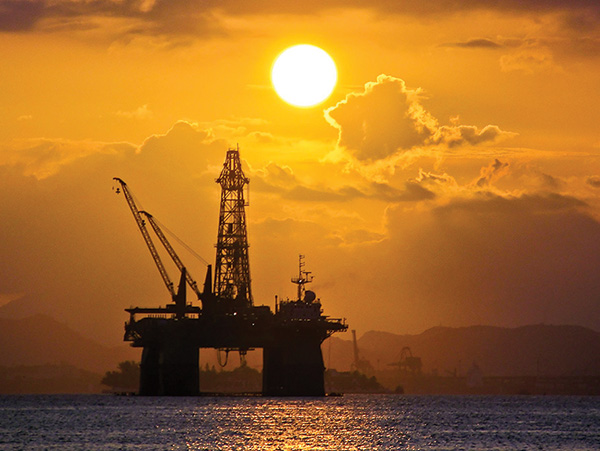Exxon to Exit Africa in Crude Phaseout, Eyeing Low-Carbon Natural Gas Options
(Reuters) — Exxon Mobil Corp. will wind down oil production in Equatorial Guinea and leave the West African country after its license expires in 2026, two sources close to the matter told Reuters.
The departure reflects a wider move by major oil producers to reduce crude production in West Africa and shift investments to lower-carbon natural gas development on the continent, and to more lucrative projects in the Americas.
"It is a high cost region where carbon emissions are a problem as well," said Gail Anderson, research director for Sub-Saharan Africa at energy consultants Wood Mackenzie.
Exxon has cut its output in the country to less than 15,000 barrels of oil per day (bbl/d) through existing production unit Serpentina, one of the sources said on Monday on condition of anonymity to discuss nonpublic information. It evacuated staff from the offshore production platform Zafiro this year due to water entering the aging vessel.
Europe, which has been looking for alternative oil suppliers after sanctions were imposed against Russia this year, is the main destination for Equatorial Guinea's oil exports.
Aging Oilfields
Exxon's oil output in Equatorial Guinea, a member of the Organization of the Petroleum Exporting Countries (OPEC), peaked at more than 300,000 barrels per day (bbl/d) eight years ago and has been declining since. Exxon has been trying to sell its Zafiro operation since 2020. The company last year pumped about 45,000 bbl/d in Equatorial Guinea, out of the country's total production of 93,000 bbl/d.
Africa is struggling to meet OPEC quotas due to the lack of investments in crude production. Output from its top two producers - OPEC-members Angola and Nigeria - sank by a third to 2.1 million bbl/d in October from 3.2 million bbl/d in 2019. Since 2013, it has declined 41%.
The region's share of oil cash flows also is falling, a study by consultancy Deloitte found. For Middle East and African oil producers, cash has dwindled to 30% of global flows in the last two years, from 50% between 2010 and 2020.
Foreign oil producers Chevron Corp., Shell Plc and Exxon have retreated from Nigeria due to rampant levels of oil theft, selling their assets mostly to local companies.
Nigeria's output is at a 32-year low and the country this year slipped behind Angola as Africa's largest exporter. TotalEnergies also exited Angola earlier this year.
Shift To Americas
As crude output in West Africa shrinks, production in the Americas is expected to grow to 28 million bbl/d next year, up 2.3 million bbl/d from pre-pandemic levels, OPEC estimates show. Much of the increase comes from the United States, Canada, Guyana and Brazil, some of the places where Exxon has increased spending on oil output.
Exxon has decided to decommission Zafiro and tow the platform away, possibly next month, one of the people said. Future revenue from Zafiro would not have covered the cost of repairs, the person said.
Exxon could recover some of Zafiro's production and reach about 25,000-30,000 bbl/d by adding a third platform called Jade, pending government and company approvals, one of the people said.
Namibia and Natural Gas
While crude oil production wanes in West Africa, the continent's LNG future is on the rise and fossil fuel output could grow elsewhere in Africa. Major producers are investing in gas and LNG as Europe looks to replace supply from sanction-blocked Russia.
Rising demand globally could result in a 30% rise in gas production in Africa by the end of the decade, Deloitte said.
Mozambique exported its first LNG cargo earlier this month from the $8 billion Coral South floating LNG consortium led by Italian oil firm Eni and Exxon. Chevron last year exported the first LNG cargo from the Alen gas project it operates in Equatorial Guinea.
Libya and Algeria produce oil at lower cost levels and could keep attracting investments if they take measures to reduce carbon emissions from current operations, a study by McKinsey and Company consultancy found.
Promising reserves of oil and gas have been discovered in Namibia, with appraisal wells expected to be drilled in the first half of next year, Wood Mackenzie's Anderson said.
"It could be the next Guyana," she said, referring to the South African nation that is home to the world's largest oil discovery in the past decade. "The signals are very positive."
Related News
Related News

- Keystone Oil Pipeline Resumes Operations After Temporary Shutdown
- Freeport LNG Plant Runs Near Zero Consumption for Fifth Day
- Biden Administration Buys Oil for Emergency Reserve Above Target Price
- Mexico Seizes Air Liquide's Hydrogen Plant at Pemex Refinery
- Enbridge to Invest $500 Million in Pipeline Assets, Including Expansion of 850-Mile Gray Oak Pipeline





Comments